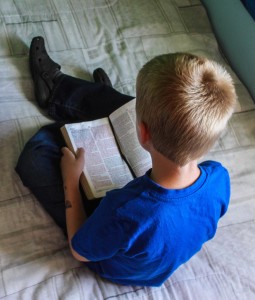 LA HARPE, Ill. — A school district in Illinois has reportedly advised one of the nation’s most conspicuous Church-State separation groups that it has disallowed a local Christian from distributing Bibles on a street near an elementary school and told the man that the police will be called should he come on campus.
LA HARPE, Ill. — A school district in Illinois has reportedly advised one of the nation’s most conspicuous Church-State separation groups that it has disallowed a local Christian from distributing Bibles on a street near an elementary school and told the man that the police will be called should he come on campus.
The Wisconsin-based Freedom From Religion Foundation (FFRF) sent a letter earlier this year to the La Harpe Community School District to complain that elementary school principal Lila McKeown includes references to Christianity and/or Scripture in flyers that are distributed at staff meetings. It also claimed that McKeown permitted an individual to offer Bibles to students.
“When Principal McKeown regularly promotes Christianity to teachers, and distributes passages from the Bible at official district-sponsored events, employees will conclude that their government employer is endorsing religion over non-religion and Christianity over all faiths,” the correspondence read.
It also asked that the district halt the Bible distribution as allowing the handout would “entangle” the school with religion and “alienate” those who do not identify as Christian.
“If the district was unaware that this Bible distribution was taking place, we request that the district take action and instruct all teachers that they may not permit third parties to distribute religious literature to students on school property during the school day or while students are entering or leaving the building,” FFRF wrote.
An attorney for the La Harpe Community School District soon responded to the atheist activist organization, advising that McKeown would discontinue quoting from Scripture in any form of school communication. However, it also noted that she knew nothing about the individual who reportedly distributed Bibles near the school.
While the person’s name or affiliation has not been provided, the attorney outlined that the individual was actually offering Bibles on the street, and that section of the street belongs to the school district. FFRF had incorrectly stated in its correspondence that the distribution was occurring at the doors of the elementary school, hence its reference to students “entering or leaving the building.”
“This individual was clearly informed that North D Street is a part of the school district campus and cannot be used for Bible distribution activities,” the response read, advising that a “cease and desist” letter was sent to the person.
Moreover, the man who distributed Bibles was told that should he come on campus, the police will be called.
“This individual was warned that law enforcement would be called should he or any affiliated persons come onto the school district campus for the purpose of distributing Bibles to students,” the letter to FFRF read.
FFRF has applauded the development, remarking that “[r]eligion is inherently divisive and has no official place in a public school where staff and young students hold varied beliefs—and no belief at all.”
However, as previously reported, in 1791—just four years after the signing of the U.S. Constitution—Dr. Benjamin Rush, a signer of the Declaration of Independence and vice-president of the Bible Society of Philadelphia, said in expressing his disagreement with deists who were opposed to using the Bible in schools:
“In contemplating the political institutions of the United States, I lament, that we waste so much time and money in punishing crimes, and take so little pains to prevent them. We profess to be republicans, and yet we neglect the only means of establishing and perpetuating our republican forms of government, that is, the universal education of our youth in the principles of Christianity by means of the Bible, for this divine book, above all others, favors that equality among mankind, that respect for just laws, and all those sober and frugal virtues, which constitute the soul of republicanism.”
Read his remarks in full here.
The first textbook used in the American colonies even before the nation’s founding, “The New England Primer,” was largely focused on the Scriptures, and was stated to be popular in public and private schools alike until approximately the early 1900’s. It used mostly the King James Bible as reference, and spoke much about sin, salvation and proper behavior.
“Save me, O God, from evil all this day long, and let me love and serve Thee forever, for the sake of Jesus Christ, Thy Son,” it read.
Noah Webster’s famous “Blue Back Speller” also referenced Christianity, including God-centered statements in reading lessons such as “The preacher is to preach the gospel,” “Blasphemy is contemptuous treatment of God,” and “We do not like to see our own sins.” Webster, a schoolmaster, is known as the “father of American education” and strongly advocated teaching children the Scriptures. Many of the Founders’ children are stated to have learned to read from the primer.
View sample pages from Webster’s Blue Back Speller here.
Become a Christian News Network Supporter...


